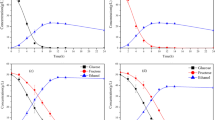Abstract
Jerusalem artichoke is a favorable substrate for inulin or fructose syrup production. The sugar content and the fructose ratio of inulin depend on various factors, particularly on the date of harvest. Incomplete fermentation of extracts by selected yeasts allows the production of inulin with increased fructose content. The yeast strains (Saccharomyces cerevisiae, S. diastaticus...) are chosen for their ability to ferment sucrose and inulin small polymers, but not easily inulin large polymers. A good increase in the fructose ratio and a good yield in residual sugars can be obtained with the better strains. After fermentation and acid or enzymatic hydrolysis, extracts from “early” and “late” harvested tubers lead to syrups of good quality containing up to 95% and 90% of fructose respectively. This fermentative enrichment process is competitive with others (for example, chromatographic enrichment), is appropriate to raw extracts, simplifies the purification steps, and also permits the simultaneous benefit of production of by-products in the form of ethanol and yeast (in addition to the pulps). Unhydrolyzed inulin polymers with high fructose content can be recovered by this selective fermentation.
Similar content being viewed by others
Literature Cited
Bacon JSD, Edelman J (1951) The carbohydrates of the Jerusalem artichokes and other Compositae. Biochem J 48:114–126
Barnett JA, Payne RW, Yarrow D (1983) Yeast characteristics and identification. Cambridge: Cambridge University Press
Bernfeld P (1955) Amylase α et β. Methods Enzymol 1: 149
Chabbert N, Braun P, Guiraud JP, Arnoux M, Galzy P (1983) Productivity and fermentablity of Jerusalem artichoke according to harvesting date. Biomass 3: 209–224
Chabbert N, Guiraud JP, Arnoux M, Galzy P (1985a) The advantageous use of an early Jerusalem artichoke cultivar for the production of ethanol. Biomass 8: 233–240
Chabbert N, Guiraud JP, Galzy P (1985b) Protein production potential in the ethanol production process from Jerusalem artichoke. Biotechnol Lett 7: 443–446
Cronin T (1988) Starch sugar competition for swetener market in Europa. Zuckerindustrie 113: 283–288
Fontana A, Hermann B, Guiraud JP (1991) Production of high fructose containing syrups from Jerusalem artichoke extracts with a fructose enrichment by fermentation, Proceedings, Inulin Symposium. Wageningen, pp. 251–258
Fuchs A (1991) Inulin: from plant to product. Comm. Int. Cong. Food Non-food Appl. Inulin, Wageningen
Guiraud JP, Galzy P (1981a) Production de fructose par hydrolyse chimique de l'inuline. Rev Ind Agric (FR.) 98: 45–52
Guiraud JP, Galzy P (1981b) Enzymatic hydrolysis of plant extracts containing inulin. Enzyme Microb Technol 3: 305–308
Guiraud JP, Galzy P (1989) Inulinases and inulin utilisation by yeasts. In: Verachtert H, De Mot R (eds) Yeast: biotechnology, biocatalysis. New York: Marcel Dekker Inc, pp 255–296
Guiraud JP, Deville-Duc T, Galzy P (1981a) Selection of yeast strains for ethanol production from inulin. Folia Microbiol 26: 147–152
Guiraud JP, Daurelles J, Galzy P (1981b) Alcohol production from Jerusalem artichoke using yeasts with inulinase activity. Biotechnol Bioeng 23: 487–493
Guiraud JP, Caillaud JM, Galzy P (1982) Optimization of alcohol production from Jerusalem artichoke. Eur J Appl Micobiol Biotechnol 14: 81–85
Haber ES, Gaessler WG, Hixon RM (1941) Levulose from chicory, dahlia and artichokes. Iowa State College of Science, Ames 16: 291–297
Hermann B, Guiraud JP (1990) Production de sirops enrichis en fructose par fermentation d'extraits de topinambour. Belg J Food Chem Biotechnol 45: 92–96
Kierstan MPJ (1980) Production of fructose syrup from inulin. Process Biochem 5: 2–4
Paschalidis S (1990) Le fructose. Bios 21: 38–40
Pawan GLS (1973) Fructose. In: Brich GC, Green LF (eds) Molecular structure and function of food carbohydrates. London: Applied Science, pp 65–80
Pilnik W (1973) Food additives. Gordian 73: 39–40
Roch-Norlund A, Hutman E, Son Nilson LH (1972) Metabolism of fructose in diabetes. In: Symposium on Clinical and Metabolic Aspects of Fructose. Acta Med Scand (suppl.): 542–548
Rutherford PP, Weston EW (1986) Carbohydrate changes during cold storage of inulin-containing roots and tubers. Phytochemistry 7: 175–180
Schorr-Galindo S (1992) Production de sirops riches en fructose à partir de topinambour, Diplome Etude Approfondie, Université de Montpellier II
Schorr-Galindo S, Fontana A, Guiraud JP (1993) Production de polymères d'inuline à partir d'extraits de topinambour. Cerevisia Biotechnol 3: 32–36
Willaman JJ (1920) Levulose syrup. Science 52: 351–352
Author information
Authors and Affiliations
Rights and permissions
About this article
Cite this article
Schorr-Galindo, S., Fontana, A. & Guiraud, J.P. Fructose syrups and ethanol production by selective fermentation of inulin. Current Microbiology 30, 325–330 (1995). https://doi.org/10.1007/BF00369858
Issue Date:
DOI: https://doi.org/10.1007/BF00369858




